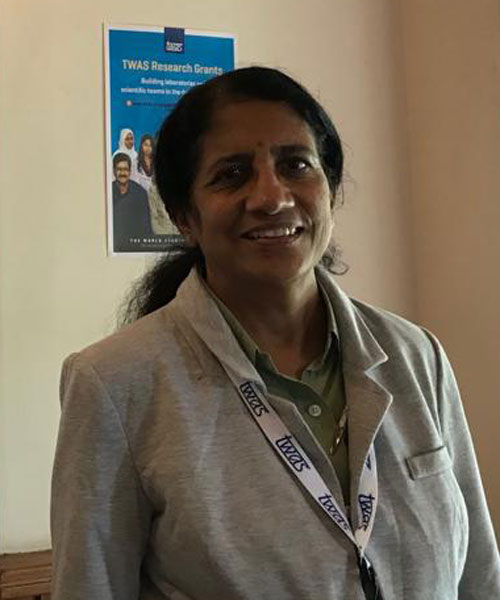
One can be an excellent researcher, but still find that success is elusive. Research skills and creativity are important, but they won't produce success if the scientist struggles to apply for research grants, or to choose a journal for publication, or to avoid the ethical tangles of plagiarism.
To sharpen these skills, scientists from developing countries in South Asia and Latin America are convening this week for a unique conference organised by TWAS in Kathmandu, Nepal. The scientists are past awardees of the TWAS Research Grants programme, and they will explore a range of skills that are critically important, but which scientists don't always learn at university.
The conference, "Building Skills for Scientific Research", runs from 4-6 June, followed on 7 June by tours of top Nepalese research facilities such as Tribhuvan University and the Research Institute for Bioscience and Biotechnology (RIBB). More than 40 participants from 11 developing countries – including Nepal, Bangladesh, Mongolia and Sri Lanka in Asia, Chile, Bolivia, Venezuela and Guatemala in Latin America – will meet for the event in Nepal's capital.
Vijaya Gopal, a former senior principal scientist at CSIR-Centre for Cellular and Molecular Biology in Hyderabad, India, is among the conference speakers. "Building skills is an integral part of research and development worldwide," she said, "and initiatives such as TWAS's to foster scientists and grantees from Nepal and other countries will inculcate the spirit of learning."
Research findings are not part of the Kathmandu agenda, added Max Paoli, programme coordinator at TWAS. "We will offer a training aimed at endowing researchers with ancillary skills that play a crucial role in all the steps following the research process, focusing on exercises that scientists can re-adapt to get the best when it comes to request a grant or protect a patent."
The first conference of TWAS Research Grant awardees was held last year in Dar es Salaam, Tanzania, with 28 past TWAS research grant winners from 17 African countries. In addition to exploring practical career skills and issues, the conference helps the scientists to build new networks. And it allows TWAS to learn what impact the grants have had on their careers.
The Swedish International Development Cooperation Agency (Sida), has provided generous support to the Research Grant programme since 1991, and it is underwriting the Nepal conference. Sida also supports the Academy's science diplomacy programme, the Organization for Women in Science for the Developing World (OWSD), and GenderInSITE. Both OWSD and GenderInSITE are hosted by TWAS at its offices in Trieste, Italy.
The Research Grants programme is one of TWAS's signature programmes, shaping the careers of thousands of scientists. It was established in 1986 to meet the needs of early-career scientists from the Global South, allowing them to purchase equipment, chemicals and scientific publications.
Over the years it has received support from the Italian Ministry of Foreign Affairs and International Cooperation, from Sida. From 1986-2018, more than 2,500 grants, worth more than USD16.6 million, have been awarded.
An intellectual and cultural exchange
Choosing Nepal as the venue has strategic importance. "Nepal is one of the 47 Least Developed Countries (LDCs) designated by the United Nations, that include the poorest and most marginalized populations in the world," Paoli explained. Plus, he added, bringing together scientists from Asia and Latin America offers the sort of cultural and scientific jolt that can inspire new ideas and new projects.
Conference speaker Vijaya Gopal, now a science education consultant, focuses her research on the use of peptide-based carriers to selectively deliver therapeutic genes and short interfering RNAs into cancer cells, aiming to reduce toxicity and maximizing efficiency in breast and ovarian cancers and additionally neurodegenerative diseases.
Gopal is a strong advocate of initiatives like the Nepali conference: "Sharing ideas with people belonging to different cultural and scientific backgrounds is important in strengthening the community of scientists and researchers," she said in an interview before the conference.
In her speech, Gopal will address the importance of teaching and plagiarism. "The joy of creating is experienced and fulfilled when one is original," she said. "Plagiarism is often born out of pressure, and steps can be taken to ensure that it does not occur."
There is a pressing need to encourage openness and expression of thoughts at an early age, she added, and this can happen if we cultivate the habit in the younger generation. "To facilitate this, performances need to be assessed based on creativity and individuality, rather than on numerical scores."
Mentoring, discussions, case studies and peer-to peer interaction are certainly among the great values of the workshop. But a number of role-playing simulations could be just as important. Simulations offer a unique opportunity to establish new collaborative networks, as happened in the Tanzania workshop last year. Paoli asked the participants to engage in a networking exercise, aimed at discovering common scientific interests and sharing techniques.
The results were encouraging: some of the researchers from the Tanzania workshop left the event having established a network of new potential partners – scientists like them, who were unaware that someone with the same research interests could live in the country right next door.

